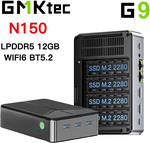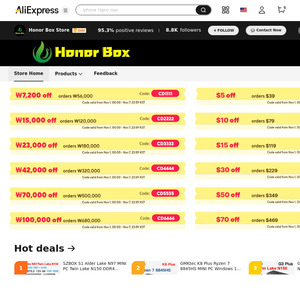Good price on this 4 Bay NAS for those who are after something takes M.2 NVMe SSDs and doesn't cost a fortune. It's an excellent choice as a media player, since the Intel N150 paired with Quick Sync works well for Plex/Jellyfin transcoding and you can expand the storage with 4 SSD slots available. Out of the box it has 64GB of eMMC storage with Windows/Linux pre-installed and 12GB of soldered LPDDR5 RAM making it RAIDy to roll right out of the box.
Featuring 4 M.2 NVMe PCIe 3.0 x2 slots with official support for up to 4TB in each slot, 64GB eMMC storage with Windows/Linux dual boot, 12GB LPDDR5 RAM (soldered), 2x HDMI 2.0 4K@60Hz, 1x USB-C full feature with PD, Data & DisplayPort output, 1x USB-C PD, 3x USB 3.2 10Gbps ports and 3.5mm audio.
For connectivity it's using two Intel i226-V 2.5GbE network ports, as well as WiFi 6 and Bluetooth 5.2. For cooling there is a CPU fan and two smaller fans for the SSDs. I recommend installing heatsinks on each SSD as they're not included.
Unfortunately due to CPU constraints the M.2 NVMe slots are limited to 2 PCIe lane (x2) instead of 4 PCIe lanes (x4), however this is still faster than having mechanical SATA HDDs.
- Apply the coupon AUOF38 or AUAF38 at checkout
- A further US$4 off discount applies automatically
AU$ based on current Mastercard rate, GST inclusive and doesn't stack with cashback.
For those paying in USD this is how you get the correct exchange rate in PayPal:
Setting overseas websites to AUD or letting PayPal do the currency conversion results in an inflated rate. To get the correct rate you need a card without international fees and do the following:
- Set the website currency to USD
- Checkout with PayPal
- Select your card with no international fees
- Click "See currency options"
- Select USD to bill the card in USD instead of AUD
- Proceed with checkout
Now you'll get the correct MasterCard or VISA exchange rate depending on the card.





Huh, the 2.5Gb networking means the most you'll get from this NAS is 250MB/s … which a mechanical hard drive can just about do, so the SSDs are basically pointless unless you want to store millions of tiny files (which are really really slow on a mechanical drive).
A 16TB mechanical drive will offer about the same throughput for dramatically less cost.